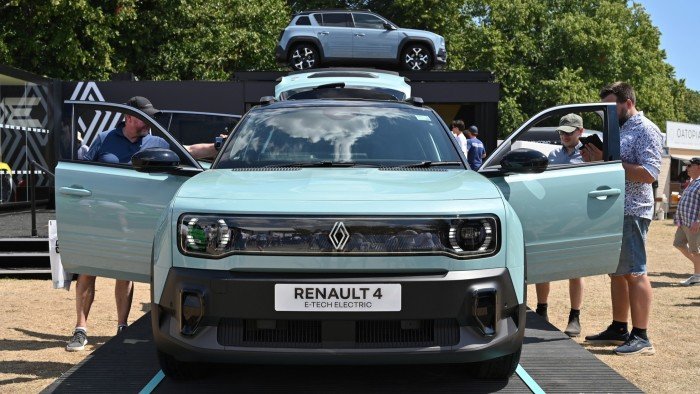Stay informed with free updates
Simply sign up to the Automobiles myFT Digest — delivered directly to your inbox.
French carmaker Renault has named finance chief Duncan Minto as interim chief executive as it lowered its annual guidance, citing weaker than expected sales in June.
In a statement on Tuesday, the company said the selection process for a permanent successor to Luca de Meo was “already well under way”. One person familiar with the matter said a new chief executive could be announced by the end of the month.
Renault said it now expected an operating margin of around 6.5 per cent for 2025, compared with its earlier forecast of 7 per cent or more. It will aim for a free cash flow of between €1bn and €1.5bn, lower than an earlier target of €2bn.
To address the rising inventories of vehicles in June and a deterioration in working capital, the company said it would carry out “a short-term cost reduction plan” involving cuts in manufacturing costs and savings in research and development.
It added details of the plan would be disclosed when it releases its quarterly results at the end of July.
According to its half-year preliminary results, its group revenue increased 2.5 per cent from a year earlier to €27.6bn, while operating margins stood at 6 per cent.
Minto will work alongside chair Jean-Dominique Senard as the group finalises its decision after De Meo abruptly announced his exit in mid-June to run luxury group Kering.
People familiar with the discussions have told the Financial Times that the company has narrowed its shortlist of CEO candidates to the boss of its Dacia brand Denis Le Vot, the group’s head of procurement, partnerships and public affairs François Provost and ex-Stellantis executive Maxime Picat.
Le Vot is a strong frontrunner for turning budget brand Dacia into one of Renault’s most successful marques. He is also known for his ability to navigate complex situations from leading the company’s supply chains operations to taking the lead on the group’s departure from Russia.
Picat left Stellantis last month after he was overlooked as the company’s chief executive in favour of its North American boss Antonio Filosa but is well respected for his diplomatic skills and deep knowledge of the Chinese and European markets.
The change in chief executive comes as Renault aims to use its relative small scale and focused geographical footprint to find new drivers of growth and counter Chinese competition and the turmoil caused by Donald Trump’s trade war.
Renault is preparing more than 20 new models that will each be developed in less than two years to match the speed of Chinese rivals in launching new and affordable electric cars with advanced software.

